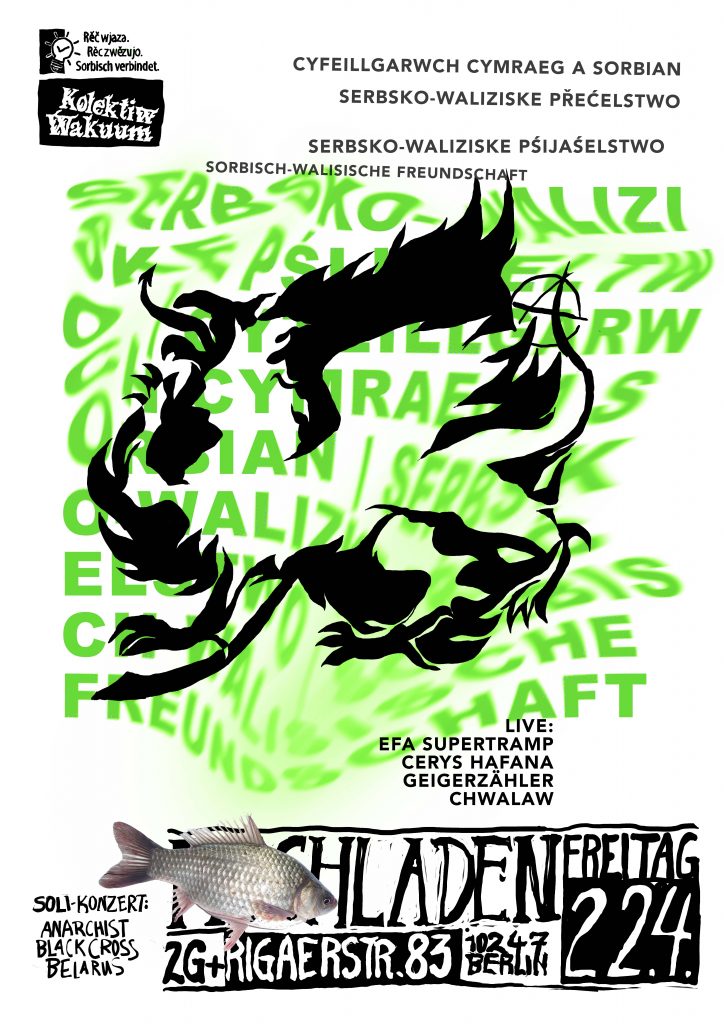Day 4
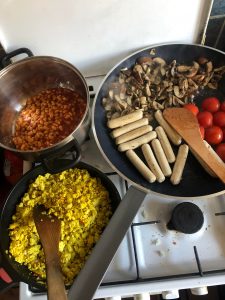
On Thursday morning I made a vegan fry-up for our crew, with some baked beans I brought over – everyone should experience a cooked breakfast of course, and it’s a solid way to start the day! Around 10:30 the band Serbska Reja turned up, they are a folk-band from this region who play sessions and Gregor one of the band members had been helping us orgainse our time here during our zoom sessions. The band consisted of an accordion, double bass, Swedish nyckelharpa and a nylon stringed guitar. Gregor is also the music editor of the Lower Sorbian radio programme of national broadcaster RBB so interviewed some of us about the project during his day with us, as he was promoting the project and gig on Saturday.
Nick isn’t a studio engineer by trade, so was looking forward to the challenge of 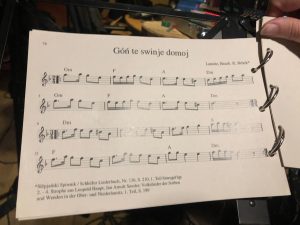 recording a band – they decided they wanted to record as a live band (not as separate tracks) and began with a Sorbian song about piglets. The track had a great energy and some powerful rhythms – they only took three takes before deciding on one. Then I printed them out the music sheets for ‘Calon Lan’ to see if they could make a rendition of it with their instruments, they performed it quickly and within a few takes again, and Paul decided he would write Sorbian lyrics with Sophia’s help and they created a cheesy and ridiculous anthem about the friendship
recording a band – they decided they wanted to record as a live band (not as separate tracks) and began with a Sorbian song about piglets. The track had a great energy and some powerful rhythms – they only took three takes before deciding on one. Then I printed them out the music sheets for ‘Calon Lan’ to see if they could make a rendition of it with their instruments, they performed it quickly and within a few takes again, and Paul decided he would write Sorbian lyrics with Sophia’s help and they created a cheesy and ridiculous anthem about the friendship 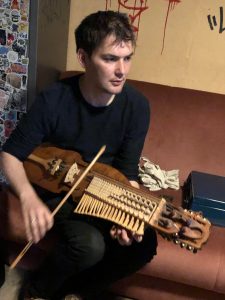 between Sorbs and the Welsh (saying we had new traditions created every breakfast time, and that the friendship was 10,000 years old! Very silly!). Then the double bass player added some jams to the song I made on the first day, Paul got the accordion player to add something on to one of his tracks, and Nick got the nyckelharpa and accordion added onto one of his dark gothy song sketches. They were playing a children’s song in a minor key, and it sounded DARK and AWESOME! They were such competent musicians and it was great to have them on board and open to creating stuff in our experimental space. Towards the end of the afternoon they had to leave. The Sorbs were busy practicing the new ‘Welsh/Sorbian anthem’ in the garden while the people from the house project we’ve been working in made a BBQ for us all. It was nice to meet the people running the space, and get to know how they organised things.
between Sorbs and the Welsh (saying we had new traditions created every breakfast time, and that the friendship was 10,000 years old! Very silly!). Then the double bass player added some jams to the song I made on the first day, Paul got the accordion player to add something on to one of his tracks, and Nick got the nyckelharpa and accordion added onto one of his dark gothy song sketches. They were playing a children’s song in a minor key, and it sounded DARK and AWESOME! They were such competent musicians and it was great to have them on board and open to creating stuff in our experimental space. Towards the end of the afternoon they had to leave. The Sorbs were busy practicing the new ‘Welsh/Sorbian anthem’ in the garden while the people from the house project we’ve been working in made a BBQ for us all. It was nice to meet the people running the space, and get to know how they organised things.
Meanwhile another member of Kollectiwwakuum called Anneli recorded a poem she had written about people who go to church, and fight for the front pew but then go home and expect their wives to have cooked everything, and cursing refugees and calling them thieves. It sounded extremely passionate and beautiful despite the fact I couldn’t understand it. Then on Friday during our final day of recording Paul has added some disharmonic violin to it and Anneli looked like she was almost in tears at hearing her work brought to life by his dramatic violin part which builds up and makes the hairs on your neck stand up. We still had more stuff we wanted to record, but by 11pm decided we were too tired and called it a day.
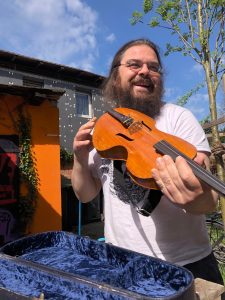
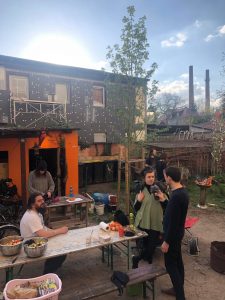
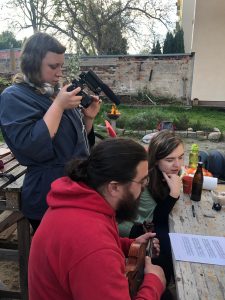
Day 5
Our final day of recording – we are all definetly starting to feel tired/run-down, but also pleased with how well we have jelled together during the week and how much different materials we’ve produced. We had a relatively chilled morning, I worked on translating the song about pigs from Sorbian to Welsh (via German and English!) and began practicing singing it along to the energetic number of Sorbska Roja.
In the early afternoon Pitko turned up – he is an older Sorbian folk singer-songwriter who also has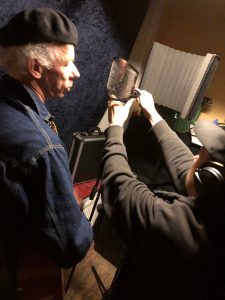 some Welsh in his vocabulary and has visited the Eisteddfod 3 times, and has some friends/connections with Wales. He also speaks both lower and upper Sorbian which is quite rare – he was a really interesting person to talk to about Sorbian history, as he currently works in the Sorbian Library after 35 years as professional musician (brought to an end by the pandemic!). He had also got a professor from Leipzig university to translate his lyrics into English and Welsh, which was super nice. Nick recorded him performing his song, and he was soon off again – it seemed like he had some place to be, and it was a great experience to meet him even if we weren’t able to create something cross-cultural together, I really appreaciated that he’d translated his lyrics into Welsh! After he left and Paul had recorded the beautiful violin for Anneli’s poem; I recorded the Welsh vocals for the pig song (Góń te swin je domoj) which was fun as it started out sweet and then got a bit pirate-y/balkany vibes! In the original song there is a lyric that says ‘I like to dance German, but I prefer dancing Sorbian much more’ and I changed it into a mini-diss (as a joke of course) to the Sorbs, so now it says ‘I like dancing Sorbian, but I like Welsh dancing much more’! It’s so niche and ridiculous, like many of the things we have created this week – it’s been fun to do these bizzare combinations of Welsh and Sorbian culture!
some Welsh in his vocabulary and has visited the Eisteddfod 3 times, and has some friends/connections with Wales. He also speaks both lower and upper Sorbian which is quite rare – he was a really interesting person to talk to about Sorbian history, as he currently works in the Sorbian Library after 35 years as professional musician (brought to an end by the pandemic!). He had also got a professor from Leipzig university to translate his lyrics into English and Welsh, which was super nice. Nick recorded him performing his song, and he was soon off again – it seemed like he had some place to be, and it was a great experience to meet him even if we weren’t able to create something cross-cultural together, I really appreaciated that he’d translated his lyrics into Welsh! After he left and Paul had recorded the beautiful violin for Anneli’s poem; I recorded the Welsh vocals for the pig song (Góń te swin je domoj) which was fun as it started out sweet and then got a bit pirate-y/balkany vibes! In the original song there is a lyric that says ‘I like to dance German, but I prefer dancing Sorbian much more’ and I changed it into a mini-diss (as a joke of course) to the Sorbs, so now it says ‘I like dancing Sorbian, but I like Welsh dancing much more’! It’s so niche and ridiculous, like many of the things we have created this week – it’s been fun to do these bizzare combinations of Welsh and Sorbian culture!
Meanwhile in the background Hella from Kollektiwwakuum has been continuing to film her documentary and interviewing the participants – she has an ambitious project in front of her as she has been interviewing people in Welsh, Upper Sorbian, Lower Sorbian, German and English! I am really looking forward to seeing how the documentary turns out and I really appreciate the multilingual approach.
For dinner Paul, Anneli and Stefan cooked another Sorbian feast up – and they bought Nick a steak to show how appreaciated it was that he had been working such long days during our sessions. Most of us have had time to relax and hang out, but Nick has been working flat-out in the make-shift studio working on producing and recording the ‘album’ of collaborations we’ve created. 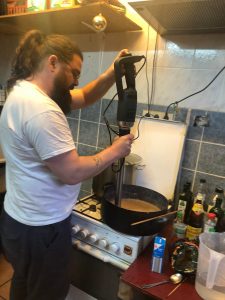
After dinner the Sorbian choir (Paul, Stefan, Jakub, Anneli, Maja, Sophia and Hella) came together ready to sing the new Welsh/Sorbian anthem – they ropped me in at the last minute as a background singer and we recorded the anthem to the tune of the hymn calon lan five times while moving around the room to create a choir effect. It really worked as a technique and we all cracked up when we heard it at the end; it was very very silly and it’s hilarious that everyone is walking around the space humming calon lan now!
A producer and rapper called Jakub Gruhl had also arrived early in the afternoon, Nick had played him some of the more hip-hop style tracks we’d created this week and gave him some options of what he could remix and rap over. He spent the afternoon writing lyrics and messing about with stems Nick had given him and later in the evening recorded vocals. His lyrics were against the right-wing German nazis in Sorbian areas, who have no concept of their history. Jakub’s vocals were the final recordings we would be doing while in Cottbus (although we still have more to do in Wales/as online collaborations which we haven’t managed to fit into this week). We opened a bottle of sekt (German fizzy wine) to celebrate the end of the recording, and listened back to what we had done throughout the day – such a great variation of stuff and styles. I think we are all extremely pleased with what we have managed to achieve this week.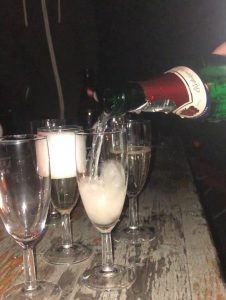
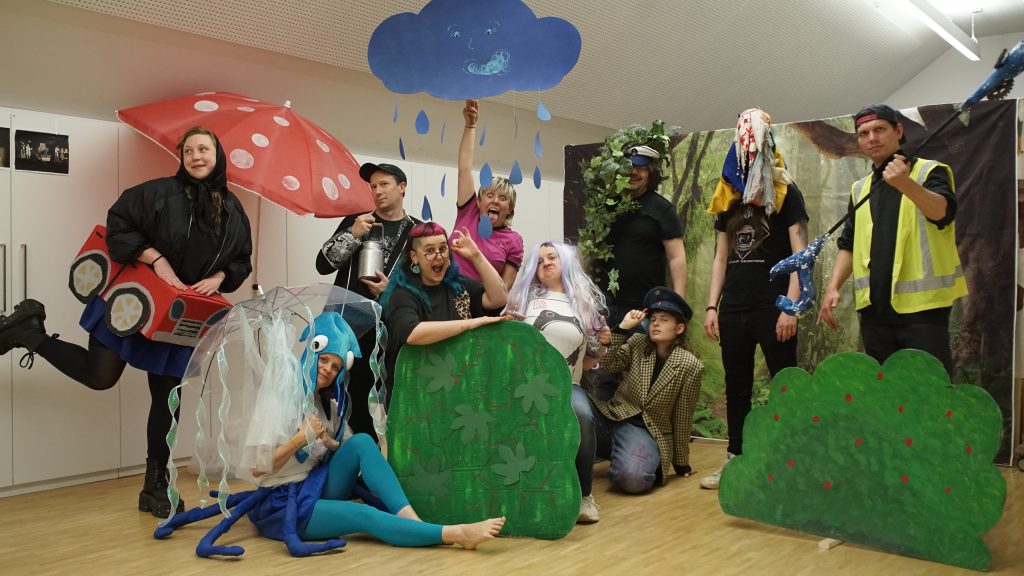
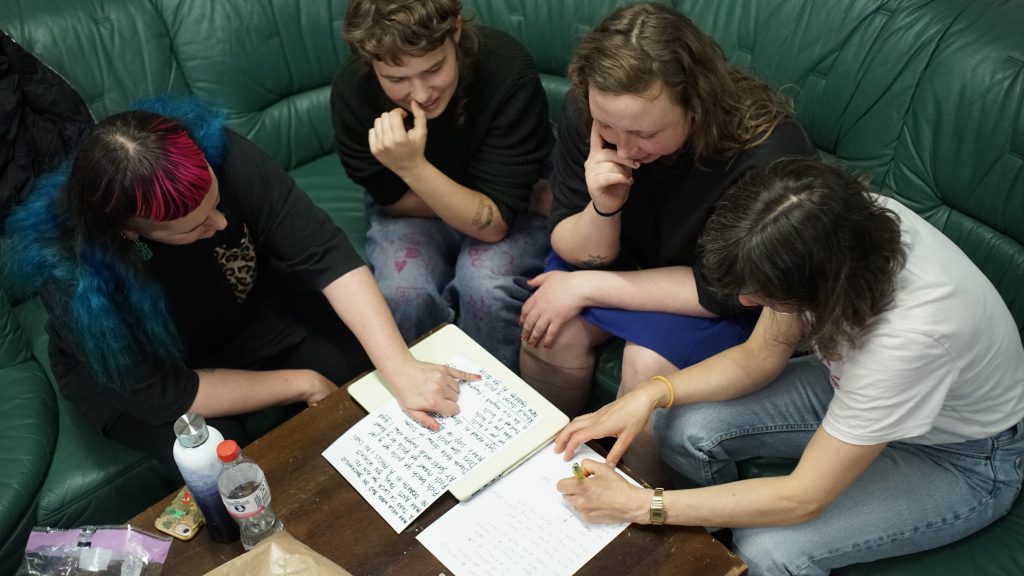
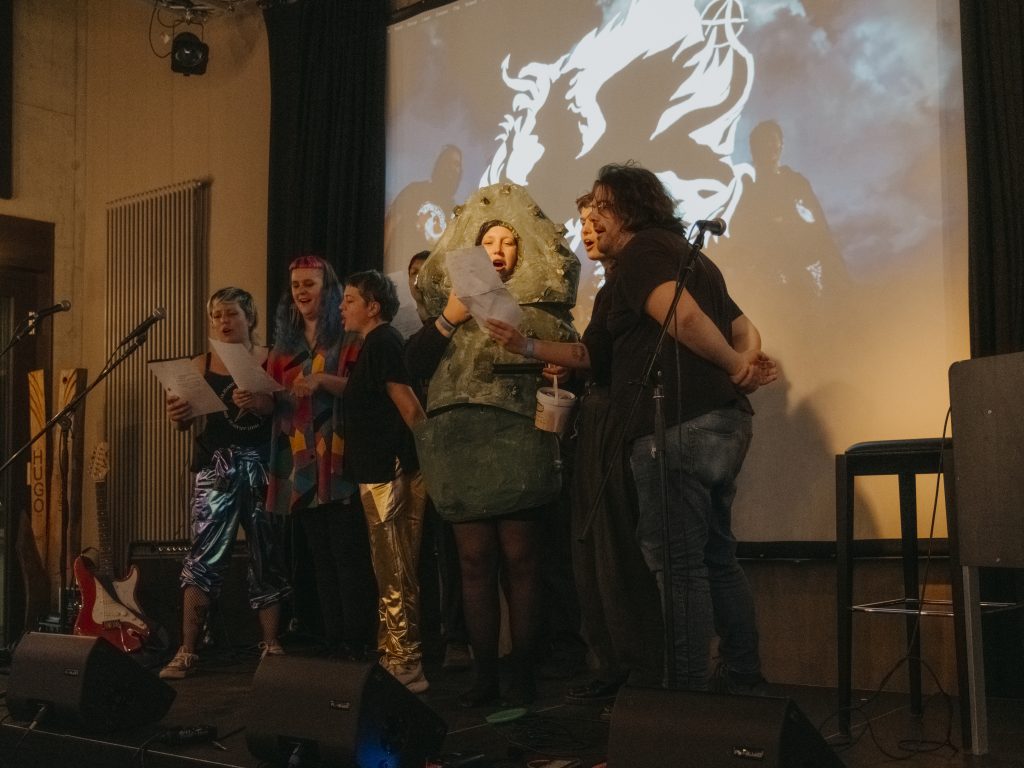

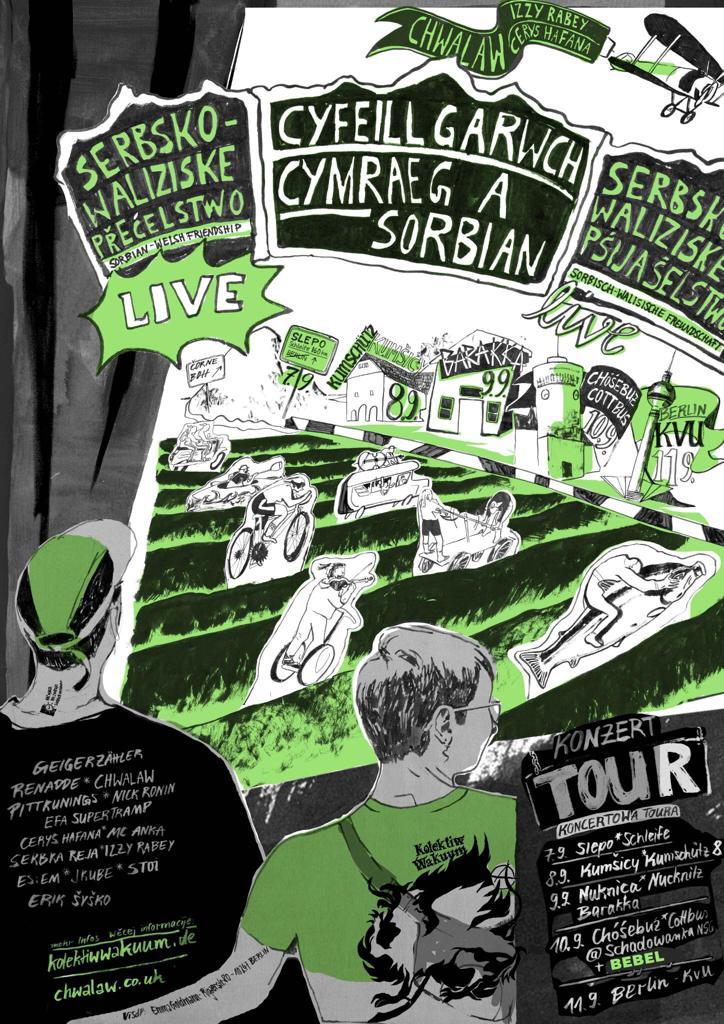
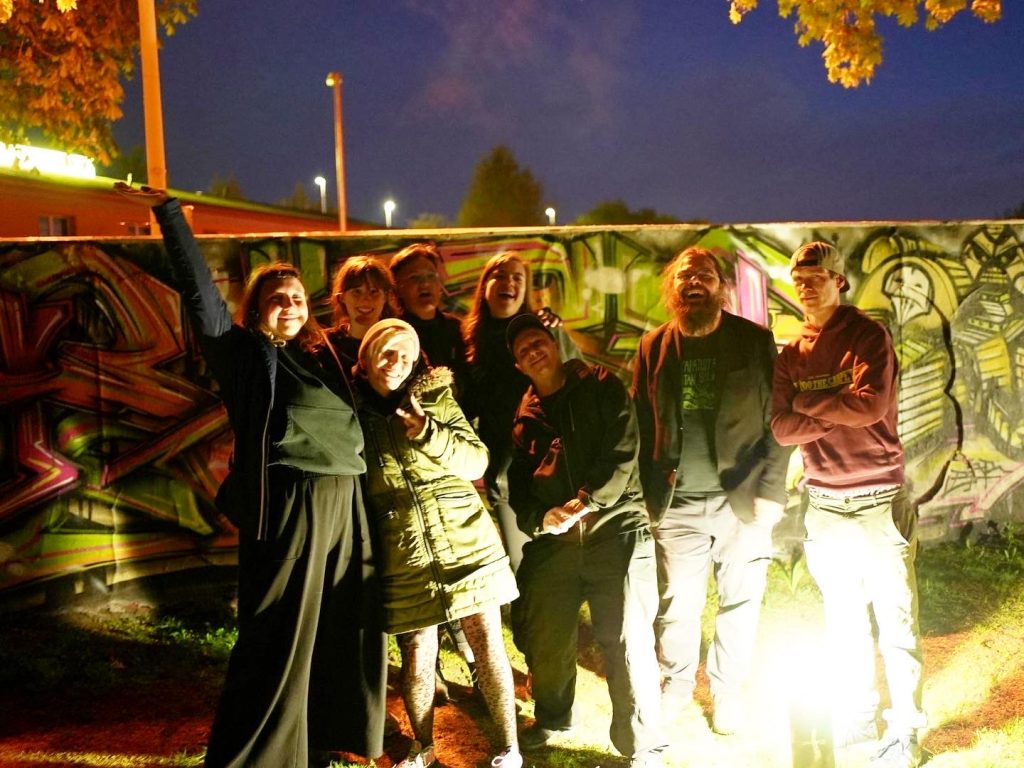


 recording a band – they decided they wanted to record as a live band (not as separate tracks) and began with a Sorbian song about piglets. The track had a great energy and some powerful rhythms – they only took three takes before deciding on one. Then I printed them out the music sheets for ‘Calon Lan’ to see if they could make a rendition of it with their instruments, they performed it quickly and within a few takes again, and Paul decided he would write Sorbian lyrics with Sophia’s help and they created a cheesy and ridiculous anthem about the friendship
recording a band – they decided they wanted to record as a live band (not as separate tracks) and began with a Sorbian song about piglets. The track had a great energy and some powerful rhythms – they only took three takes before deciding on one. Then I printed them out the music sheets for ‘Calon Lan’ to see if they could make a rendition of it with their instruments, they performed it quickly and within a few takes again, and Paul decided he would write Sorbian lyrics with Sophia’s help and they created a cheesy and ridiculous anthem about the friendship  between Sorbs and the Welsh (saying we had new traditions created every breakfast time, and that the friendship was 10,000 years old! Very silly!). Then the double bass player added some jams to the song I made on the first day, Paul got the accordion player to add something on to one of his tracks, and Nick got the nyckelharpa and accordion added onto one of his dark gothy song sketches. They were playing a children’s song in a minor key, and it sounded DARK and AWESOME! They were such competent musicians and it was great to have them on board and open to creating stuff in our experimental space. Towards the end of the afternoon they had to leave. The Sorbs were busy practicing the new ‘Welsh/Sorbian anthem’ in the garden while the people from the house project we’ve been working in made a BBQ for us all. It was nice to meet the people running the space, and get to know how they organised things.
between Sorbs and the Welsh (saying we had new traditions created every breakfast time, and that the friendship was 10,000 years old! Very silly!). Then the double bass player added some jams to the song I made on the first day, Paul got the accordion player to add something on to one of his tracks, and Nick got the nyckelharpa and accordion added onto one of his dark gothy song sketches. They were playing a children’s song in a minor key, and it sounded DARK and AWESOME! They were such competent musicians and it was great to have them on board and open to creating stuff in our experimental space. Towards the end of the afternoon they had to leave. The Sorbs were busy practicing the new ‘Welsh/Sorbian anthem’ in the garden while the people from the house project we’ve been working in made a BBQ for us all. It was nice to meet the people running the space, and get to know how they organised things.


 some Welsh in his vocabulary and has visited the Eisteddfod 3 times, and has some friends/connections with Wales. He also speaks both lower and upper Sorbian which is quite rare – he was a really interesting person to talk to about Sorbian history, as he currently works in the Sorbian Library after 35 years as professional musician (brought to an end by the pandemic!). He had also got a professor from Leipzig university to translate his lyrics into English and Welsh, which was super nice. Nick recorded him performing his song, and he was soon off again – it seemed like he had some place to be, and it was a great experience to meet him even if we weren’t able to create something cross-cultural together, I really appreaciated that he’d translated his lyrics into Welsh! After he left and Paul had recorded the beautiful violin for Anneli’s poem; I recorded the Welsh vocals for the pig song (Góń te swin je domoj) which was fun as it started out sweet and then got a bit pirate-y/balkany vibes! In the original song there is a lyric that says ‘I like to dance German, but I prefer dancing Sorbian much more’ and I changed it into a mini-diss (as a joke of course) to the Sorbs, so now it says ‘I like dancing Sorbian, but I like Welsh dancing much more’! It’s so niche and ridiculous, like many of the things we have created this week – it’s been fun to do these bizzare combinations of Welsh and Sorbian culture!
some Welsh in his vocabulary and has visited the Eisteddfod 3 times, and has some friends/connections with Wales. He also speaks both lower and upper Sorbian which is quite rare – he was a really interesting person to talk to about Sorbian history, as he currently works in the Sorbian Library after 35 years as professional musician (brought to an end by the pandemic!). He had also got a professor from Leipzig university to translate his lyrics into English and Welsh, which was super nice. Nick recorded him performing his song, and he was soon off again – it seemed like he had some place to be, and it was a great experience to meet him even if we weren’t able to create something cross-cultural together, I really appreaciated that he’d translated his lyrics into Welsh! After he left and Paul had recorded the beautiful violin for Anneli’s poem; I recorded the Welsh vocals for the pig song (Góń te swin je domoj) which was fun as it started out sweet and then got a bit pirate-y/balkany vibes! In the original song there is a lyric that says ‘I like to dance German, but I prefer dancing Sorbian much more’ and I changed it into a mini-diss (as a joke of course) to the Sorbs, so now it says ‘I like dancing Sorbian, but I like Welsh dancing much more’! It’s so niche and ridiculous, like many of the things we have created this week – it’s been fun to do these bizzare combinations of Welsh and Sorbian culture!

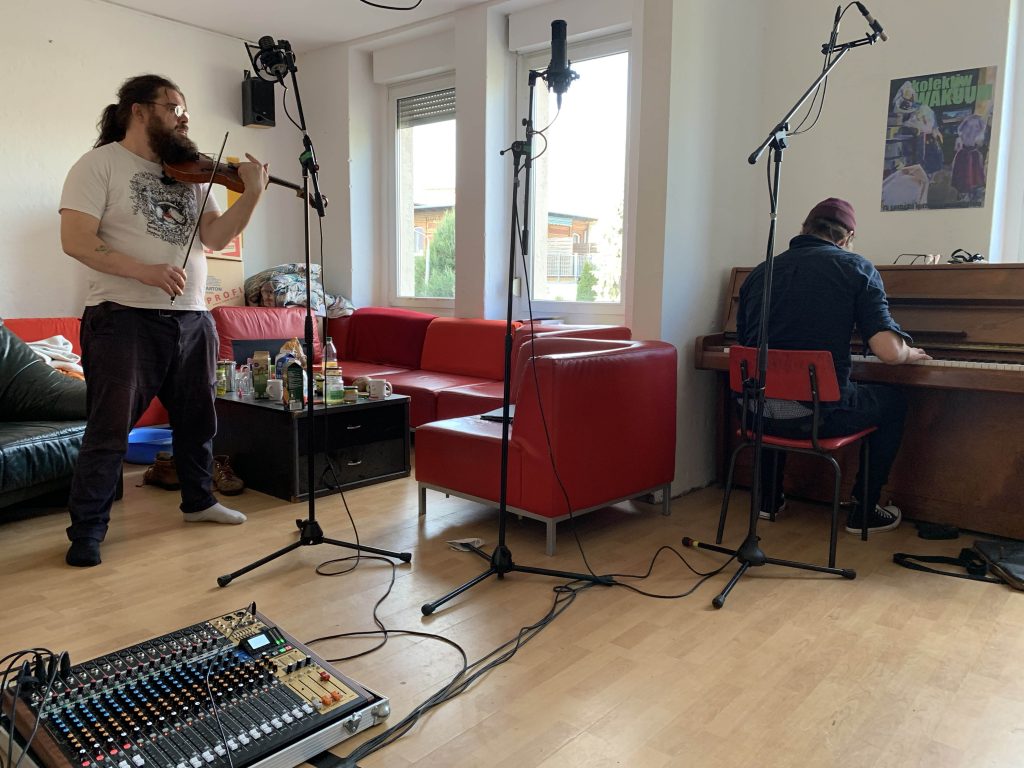
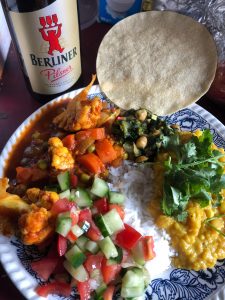
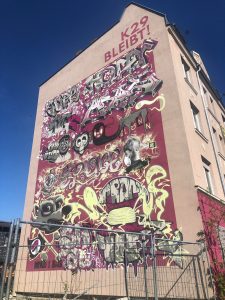
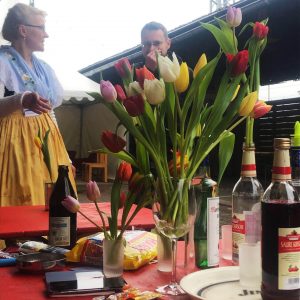 was great to meet more of the collective and to see what they have been creating and supporting and it was cool to watch a queer feminist rap video, right next to a stall showcasing a spinning wheel for wool and traditional dresses. We were invited to take a schnapps that the collective had created, it was a strange mix of spirits made from corn, cherry syrup and linseed oil. At the market we also met up with Sophia, who is a producer under the name
was great to meet more of the collective and to see what they have been creating and supporting and it was cool to watch a queer feminist rap video, right next to a stall showcasing a spinning wheel for wool and traditional dresses. We were invited to take a schnapps that the collective had created, it was a strange mix of spirits made from corn, cherry syrup and linseed oil. At the market we also met up with Sophia, who is a producer under the name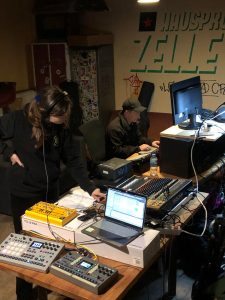 setting up downstairs in the make-shift studio, with their technical set-ups. Sophia uses hardware/synths, and Nick is more of an expert on Ableton – they managed to link-up their set-ups but in the end decided to work separately for the afternoon because Nick was creating loops of Paul’s recordings of traditional Sorbian songs which Sophia said she couldn’t connect with, so she moved her set-up upstairs and made some beats using her hardware, in preparation for some rappers who would be visiting us in the next days.
setting up downstairs in the make-shift studio, with their technical set-ups. Sophia uses hardware/synths, and Nick is more of an expert on Ableton – they managed to link-up their set-ups but in the end decided to work separately for the afternoon because Nick was creating loops of Paul’s recordings of traditional Sorbian songs which Sophia said she couldn’t connect with, so she moved her set-up upstairs and made some beats using her hardware, in preparation for some rappers who would be visiting us in the next days.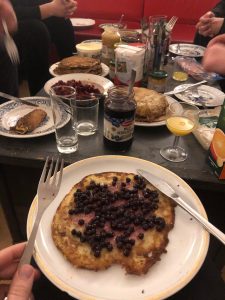 I recorded a guitar loop, Nick added a drum-pattern and a bass synth (until someone can play a real double-bass onto it later in the week), then I added the vocals and sampled some of
I recorded a guitar loop, Nick added a drum-pattern and a bass synth (until someone can play a real double-bass onto it later in the week), then I added the vocals and sampled some of 